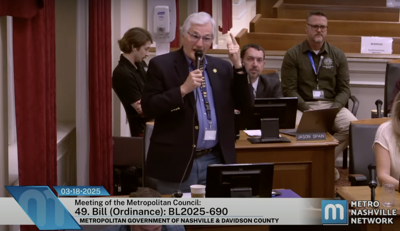In a nearly five-hour meeting Tuesday night, the Metro Council passed two highly disputed bills on historic zoning and a community camera monitoring network — with each commanding several hours of the meeting with debate and public comment.
Metro Historic Zoning
The council passed an ordinance that will put the staff of the Metro Historic Zoning Commission under the authority of the Metro Planning Department. The bill’s sponsor Councilmember Emily Benedict said part of the motivation for the bill was proposed state legislation that could limit the power of local historic preservation bodies.
City looks to counteract proposed state legislation that could impact local commissions
“This bill reorganizes the Historic Zoning staff,” Benedict said at the meeting. “As we work on the city’s growth, we should have historic voices working alongside the planning staff. Today that is a siloed relationship. This bill will make the departments work more efficiently together. ... We’ve seen the state take away control of so much. We can’t let them do that here.”
The bill received support from historic advocacy groups including the Preservation Society of Nashville and Historic Nashville Inc.
Many opponents of the bill who spoke during public comment worried the bill was rushed through council and will strip the commission of its autonomy. They argued that the bill favors downtown businesses and won’t prevent development in neighborhoods.
Councilmember Clay Capp spoke against the bill, expressing concern that the council is falling into pressure from state lobbyists.
“Getting a bill filed up on the hill, if that’s used as a threat against us to do whatever the lobbyist or whoever got that bill filed wants us to do,” Capp said. “If we go along with that tactic, we are telling every lobbyist in town all you have to do to get whatever you want out of the Metro Council is to go file a bill in the legislature and we’ll give you whatever they want.”
The bill passed 24-11-1.
Fusus Camera Network
Mayor, a longtime police skeptic, now favors video surveillance tool as it heads toward a council compromise
Another contentious bill passed Tuesday night will add guardrails to Fusus, a camera surveillance system that would allow the Metro Nashville Police Department to access businesses’ private security footage with the owner’s consent to address calls for service.
The guardrails received support from Mayor Freddie O’Connell and failed before the council by one vote last year — this time receiving eight additional votes to pass 28-7-1.
Much of the debate in the council echoed prior meetings, with opponents arguing that the cameras are examples of government overreach and could target marginalized communities.
Councilmember Sandra Sepulveda spoke against the bill, saying she wants to protect the people she represents.
“This conversation does feel like we are speaking two different languages,” Sepulveda said. “Several people are talking about property, and at the end of the day, I am talking about people. ... I’m going to put my constituents, the people that are the most vulnerable at this point in time, above property.”
Surveillance camera network bill advances to final reading
Another major concern of those opposed to Fusus is that it could store or track data, something O’Connell has repeatedly said is not true. Councilmember Bob Nash has backed the bill from the beginning and continued to show his support Tuesday night, reiterating O’Connell’s message about data.
“We’re not creating any new data of any sort,” Nash said. “We are just collecting pictures when someone commits a crime. ... Nothing in this lets us know your immigration status, has nothing to do with your sexual preferences. It is just a photo of a criminal leaving a business.”
Though Metro approved the guardrails for the camera system, an official contract with Fusus must also come before the council.
This article was first published by our sister publication, the Nashville Post.








